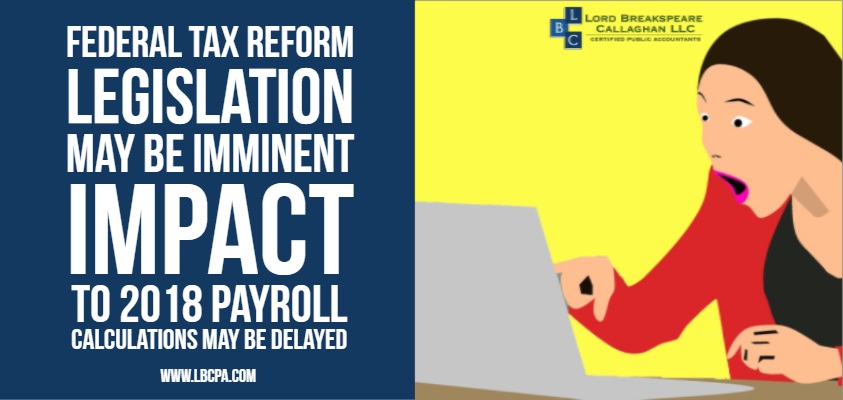LBCPA News 
Click here to go back
Federal Tax Reform Legislation May Be Imminent Impact to 2018 Payroll Calculations May Be Delayed

Different versions of H.R. 1, the Tax Cuts and Jobs Act, were enacted by the House and Senate, and a Conference Committee has been established to reconcile the differences. Any revised legislation from the conference committee would need to be presented to both the House and Senate for approval, and signed by the President. Congressional leadership and the White House have targeted December 22 for enactment.
While the legislation provides that the revised tax rates will take effect on January 1, ADP has already spoken with the Internal Revenue Service (IRS) about implementation and possible transition measures. On December 7, the IRS indicated that they would delay guidance until the legislation is finalized.
IRS guidance, which is typically released in advance of each new tax year – including withholding tables,
Form W-4, Employee’s Withholding Allowance Certifi cate; Circular E, Employer’s Tax Guide (Publication 15), and others – will not be issued for some time. Further, since the IRS and Treasury will need to analyze the legislation and develop new withholding tables and related guidance, employers should continue using 2017 withholding calculations and 2017 Forms W-4 until revised IRS forms, withholding calculations, and other guidance is released.
On December 13, the IRS released the following statement:
“The IRS is continuing to closely monitor the pending legislation in Congress, and we are taking the initial steps to prepare guidance on withholding for 2018. We anticipate issuing the initial withholding guidance (Notice 1036) in January refl ecting the new legislation, which would allow taxpayers to begin seeing the benefi ts of the change as early as February. The IRS will be working closely with the nation’s payroll and tax professional community during this process.”
Historical Perspective
The American Recovery and Reinvestment Act of 2009 (Public Law 111-5), was enacted on February 17, 2009, but effective January 1, 2009. The IRS issued revised withholding tables within days of enactment, announcing that the new tables should be implemented “as soon as possible, but not later than April 1.”
White House press release related to the ARRA, April 15, 2009:
“According to ADP, the nation’s largest payroll service provider, more than 80% of workers paid through ADP received the Making Work Pay tax credit in paychecks dated March 1 or later, and virtually all of their clients began using the new withholding tables by March 6th.”
Form W-4 Expected to Be Substantially Revised
Both the House and Senate versions eliminated personal exemptions, which are currently key factors in withholding calculations. Employees typically establish withholding allowances on Forms W-4, based in part on the number of personal exemptions that they expect to report on income tax returns. It seems likely that Forms W-4 may need to be substantially revised and reissued by the IRS, which could take a number of weeks or months. In the meantime, the IRS expects to issue guidance permitting employers to continue relying on existing Forms W-4, and will permit a reasonable transition period when the revised Form W-4 is issued.
The IRS spokesman noted that, “For example, if you have employees who claim exemption from
withholding and are therefore required to provide you a new Form W-4 each year, we’ll allow them to do that with a 2017 Form W-4, as long as it is newly completed, signed and dated.”
Some employees may ask questions about the effect of the legislation, or may submit revised Forms W-4 to modify their withholding allowances for 2018. Employers should be prepared to accept revised Forms W-4, but may wish to advise employees that a revised Form W-4 will be issued later in 2018, and that the employee may need to complete a revised form at that time.
Both versions of the proposed Tax Cuts and Jobs Act would change the tax treatment of various employee benefi ts. Once the legislation is enacted, a separate Eye on Washington will discuss these changes in detail.
ADP Compliance Resources
ADP maintains a staff of dedicated professionals who carefully monitor federal and state legislative and regulatory measures affecting employment-related human resource, payroll, tax and benefi ts administration, and help ensure that ADP systems are updated as relevant laws evolve. For the latest on how federal and state tax law changes may impact your business, visit the ADP Eye on Washington
Web page located at www.adp.com/regulatorynews.
ADP is committed to assisting businesses with increased compliance requirements resulting from rapidly evolving legislation. Our goal is to help minimize your administrative burden across the entire spectrum of employment-related payroll, tax, HR and benefits, so that you can focus on running your business. This information is provided as a courtesy to assist in your understanding of the impact of certain regulatory requirements and should not be construed as tax or legal advice. Such information is by nature subject to revision and may not be the most current information available. ADP encourages readers to consult with appropriate legal and/or tax advisors. Please be advised that calls to and from ADP may be monitored or recorded.
If you have any questions regarding accounting, domestic taxation, international taxation, IRS representation, U.S. tax implications of Real Estate transactions or financial statements, please. give us a call at 305-274-5811
Source: ADP






